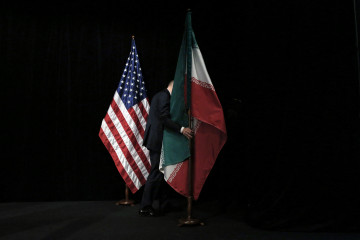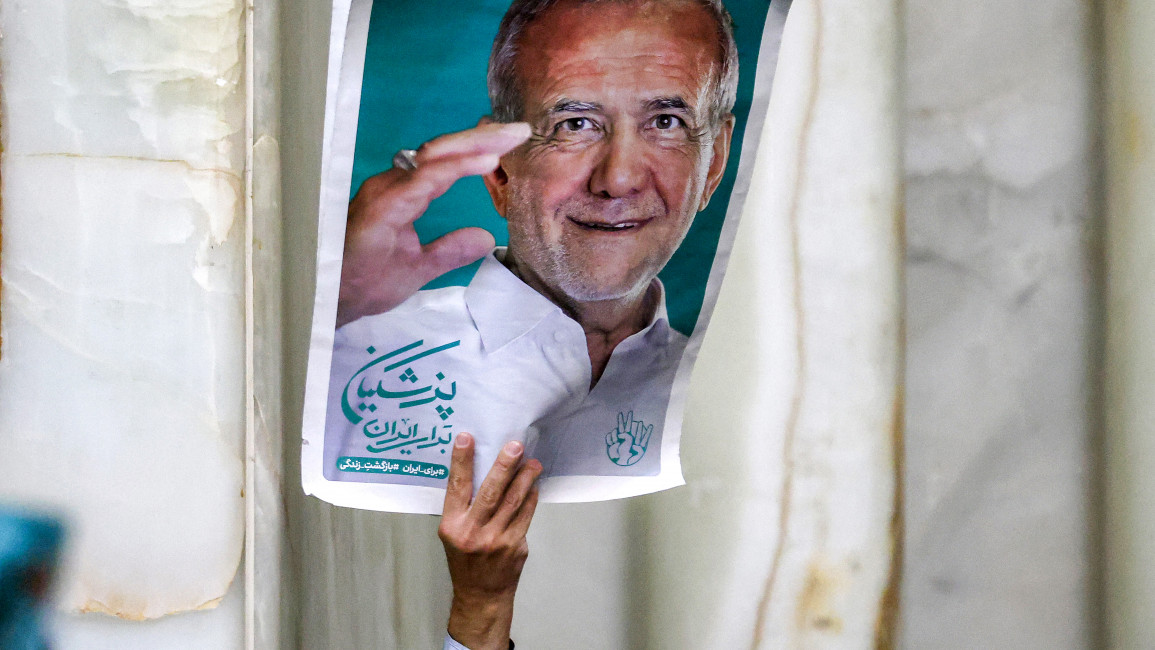

The surprise victory of largely unknown cardiac surgeon Masoud Pezeshkian in Iranian presidential elections earlier in July has presented an opportunity for Tehran, its neighbours, and the West to turn a new page in diplomatic efforts.
In stark contrast with his top challenger, the anti-Western ultraconservative Saeed Jalili, the new Iranian president is affiliated with the so-called reformist camp.
Although much of his election campaign was focused on domestic issues, he also emphasised the importance of engaging with the West, in part to bolster Iran’s poor economic situation.
One of the most important issues for Iran will be the future of its nuclear policy, which currently hangs in the balance. Moreover, Pezeshkian also supports de-escalation with Arab countries and is expected to further bolster ties with Iran’s Arab Gulf neighbours.
Limits of power for Iran's president
None of these issues will be an easy task, however, as Iran’s foreign and security policy is heavily influenced by its supreme leader, Ali Khamenei, who maintains control over key foreign policy decisions. The president's official powers are mostly affiliated with domestic issues.
Furthermore, the new president will also have to deal with the Islamic Revolutionary Guard Corps (IRGC), known for its hardline anti-Western stance, which over the years has become one of the main pillars of the Iranian regime.
That said, and depending on the issue, “the president and his cabinet members can somewhat impact this policy symbolically and substantively,” explained Dr Eric Lob, an associate professor in the Department of Politics and International Relations at Florida International University, to The New Arab.
Many observers speculate that the chief foreign policy adviser for Pezeshkian’s campaign, Mohammad Javad Zarif, the former foreign minister who brokered the nuclear deal with world powers in 2015, will be his right-hand man in any attempts to revive nuclear deal negotiations with the US.
“The question is whether the supreme leader and other conservatives would support the president in this endeavour as they had done with Rouhani leading up to the signing of the JCPOA in 2015,” Dr Lob added.
According to Dr Ali Vaez, Director of Crisis Group's Iran Project, while Pezeshkian's ability to substantively alter the course of Iran’s domestic and foreign policies remains uncertain, his aversion to making any concrete commitments during the campaign, and an acknowledgement of the limits he might face as president, have tempered popular expectations, granting him more leeway than most of his predecessors.
While the elections granted him a weak mandate - he won only 26 percent of the eligible electorate’s votes - “it would be as wrong to assume that Pezeshkian would be able to change everything as to assume he will be able to change nothing,” Vaez told TNA.
Volatile context
While Pezeshkian would like a new nuclear arrangement that would lead to at least a partial lifting of sanctions, it could prove to be a difficult undertaking.
“President Trump’s pull-out from the old nuclear deal drastically undermines the credibility of US promises, and Iran’s build-up of centrifuges and highly enriched uranium stocks (and refusal to offer honest answers to questions about undeclared sites where the IAEA has found uranium particles) have changed the facts on the ground,” Matthew Bunn, James R. Schlesinger Professor of the Practice of Energy, National Security, and Foreign Policy from Harvard Kennedy School, told TNA.
Since the unilateral US withdrawal from the JCPOA and reimposition of sanctions against Iran in 2018, and after one year of strategic patience, Tehran expanded its nuclear activities to become a threshold state.
According to an International Atomic Energy Agency (IAEA) report, Iran has lifted the cap related to the uranium enrichment level specified by the agreement, from 3.67 percent to 60 percent, which is 27 times higher than the level permitted.
While deep historical mistrust presents formidable challenges and complicates the path to a renewed agreement, any further dialogue will take place in a highly volatile moment as the Gaza war is likely to continue to reverberate throughout the region, increasing the risks of confrontation between Israel and Iran on par with or even worse than the direct exchange of fire between them in April.
Iran has also significantly improved its ties with Russia and China, while Iran’s continued or escalated military support for Russia’s war against Ukraine could undercut any possibility of a thaw in Iran-West relations.
Boiling tensions between the United States and Israel and forces backed by Iran in Lebanon, Syria, Iraq, and Yemen may diminish the possibility of new agreements between Washington and Tehran.
|
|
Diplomacy is the only alternative
However, in Vaez’s opinion, “none of these should derail diplomacy as the alternative is proven to be worse. It would be, therefore, short-sighted for the West to overlook the opportunity that the return of the more pragmatic forces of Iranian politics and the country's most seasoned diplomats offer as a lack of engagement and pressure tactics have only rendered Iran more aggressive in the region and more repressive at home,” he noted.
However, Dr Rouzbeh Parsi, Head of the Middle East and North Africa program at the Swedish Institute of International Affairs, observes that all signs point towards trying the same failed policies of confrontation and pressure rather than understanding that this is an opportunity to try the more difficult but much more rewarding approach of negotiations.
“In many ways, Western politicians seem to have forgotten what the JCPOA negotiations ought to have taught them about how to deal with Iran,” he told TNA.
Instead, the war in Gaza and a potential extension to the Lebanese front, with all the ramifications of a potentially regional war, would encourage Western countries to approach Iran differently. “It is more likely that they will see such a war as a confrontation where Iran is simply the culprit,” Parsi noted.
In a similar vein, Vaez explains that there are formidable forces in Washington who will do everything in their power to turn Iran into another Cuba: an island surrounded by sanctions. For their part, the Iranians are also deeply cynical about the United States' reliability as a negotiating partner, given the experience of Trump's withdrawal from the 2015 nuclear deal.
However, “neither side has a viable alternative to diplomacy: Washington needs to find a way to curb Iran's nuclear program, which is now on the threshold of weaponisation; Tehran needs to find a way to get out from under US sanctions, which is only possible through negotiations and concessions,” Vaez said.
Nevertheless, most analysts believe that the US position and policy on Iran will largely depend on the outcome of the presidential election, though there is a lot of uncertainty surrounding both candidates.
“While the new Democratic party nominee (probably Kamila Harris, in case of victory) may try to improve the former administration’s foreign policy achievements after having few, if any, and revive the nuclear deal, she/he may continue to be too consumed by crises like those in Ukraine and Gaza to dedicate the time, attention, and capital to a new deal,” Lob noted.
If Trump were to win, meanwhile, he could continue to double down on maximum pressure, “but he could pursue a new agreement as an opportunity to position or portray himself as the ultimate dealmaker,” Lob added.
In the case of a future agreement, Professor Bunn expects a “less for less” deal in which Iran would roll back some of the most dangerous elements of its program (such as its stocks of highly enriched uranium) in return for a lifting of some sanctions, while broader discussions with more actors could reduce ongoing conflicts in the Middle East - from open wars to shadow wars - and address the security concerns of key regional players.
While it is doubtful that any serious deal could be reached before the US election, the current administration could be using back channels to explore what might be possible right now.
Stasa Salacanin is a freelance journalist who has written extensively on Middle Eastern affairs, trade and political relations, Syria and Yemen, and terrorism and defence.





 Follow the Middle East's top stories in English at The New Arab on Google News
Follow the Middle East's top stories in English at The New Arab on Google News


